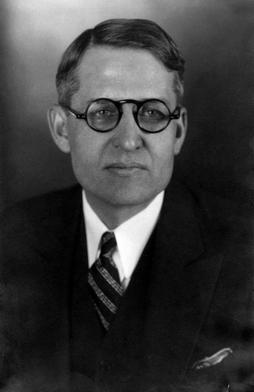Harvey Fletcher facts for kids
Quick facts for kids
Harvey Fletcher
|
|
|---|---|
 |
|
| Born | September 11, 1884 Provo, Utah, U.S.
|
| Died | July 23, 1981 (aged 96) Provo, Utah, U.S.
|
| Alma mater | Brigham Young University University of Chicago |
| Known for | Invention of the hearing aid The father of stereophonic sound Oil drop experiment measuring the charge of the electron |
| Awards | Presidential Citation ASA Gold Medal (1957) Louis E. Levy Medal IEEE Founders Medal (1967) Grammy Award (2016) |
| Scientific career | |
| Fields | Physics |
| Institutions | Western Electric Bell Laboratories Columbia University |
| Doctoral advisor | Robert A. Millikan |
Harvey Fletcher (born September 11, 1884 – died July 23, 1981) was an American physicist. He is often called the "father of stereophonic sound" because of his amazing work with sound. He also invented important things like an early electronic hearing aid and a device called the 2-A audiometer which helps test hearing.
Fletcher studied how we hear and speak. He made big contributions to many fields, including sound, electricity, and even music. After he passed away, it became known that he helped his professor, Robert Millikan, with a famous experiment. This experiment, called the oil drop experiment, helped measure the tiny electric charge of an electron. Millikan later won a Nobel Prize for this work.
Contents
Early Life and Education
Harvey Fletcher was born in Provo, Utah. He finished high school at Brigham Young High School in 1904. He then went to Brigham Young University (BYU) and earned his bachelor's degree in 1907.
He married Lorena Chipman, and they had seven children together. His son, James C. Fletcher, later became the president of the University of Utah and even led NASA. Another son, Harvey J. Fletcher, became a math professor at BYU.
Graduate Studies and the Oil Drop Experiment
In 1911, Fletcher became the first physics student to earn a PhD from the University of Chicago with the highest honors. His research was about finding ways to measure the charge of an electron. This included the famous oil drop experiment.
This experiment is usually credited only to his advisor, Robert Andrews Millikan. However, Fletcher played a key role in its success. He kept his help a secret until his death. Millikan later won the 1923 Nobel Prize for Physics partly for this work.
A Career in Science and Sound
After getting his PhD, Fletcher returned to BYU. He became the head of the physics department from 1911 to 1916. Later, he left BYU to work as a researcher at Western Electric.
He then joined the research department at Bell Telephone Laboratories. There, he became very interested in the physics of sound, also known as acoustical science. He worked at Bell Labs from 1933 to 1949.
After Bell Labs, he became a professor of electrical engineering at Columbia University from 1949 to 1952. He returned to BYU in 1952. He was the Director of Research and the first dean of the new College of Physics and Engineering Sciences until 1958.
Major Discoveries and Inventions
Fletcher made many important contributions to how we understand speech perception. He showed that different parts of speech are spread across a wide range of sound frequencies. He also created the articulation index to measure how clear a speech channel is.
He also developed ideas like equal-loudness contours, which show how loud different sounds need to be for us to hear them as equally loud. These are sometimes called Fletcher–Munson curves. He also worked on how we hear loudness and the idea of the critical band in hearing.
Innovations in Sound Recording
At Bell Labs, Fletcher led research in electrical sound recording. His team achieved the first successful stereophonic recordings. They also made the first live stereo sound transmission and produced the first vinyl record. This amazing work was done with the help of conductor Leopold Stokowski between 1931 and 1932.
Fletcher's other inventions include the first working hearing aid, the 2-A audiometer, and the artificial larynx. He greatly influenced other scientists at Bell Labs, like Harold Burris-Meyer, who made advances in psychoacoustics (the study of how we perceive sound).
His books, Speech and Hearing and Speech and Hearing in Communication, are considered very important in the field.
Awards and Recognition
Fletcher received many honors for his work. In 1949, he was made an honorary fellow of the Acoustical Society of America. He was only the second person to receive this honor, after Thomas Edison.
He was also president of the American Society for Hard of Hearing. He was an honorary member of the American Otological Society and the Audio Engineering Society. In 1924, he received the Louis E. Levy Medal for his work on measuring hearing. He was also president of the American Physical Society and the first president of the Acoustical Society of America (1929–31).
In 2010, BYU honored Fletcher as the founding dean of its College of Engineering. On April 23, 2016, Fletcher was given a special technical Grammy Award after his death. This award recognized his research and inventions related to stereophonic sound.
Personal Life
Harvey Fletcher was a dedicated member of the Church of Jesus Christ of Latter-day Saints. He passed away on July 23, 1981, after having a stroke.
 | Mary Eliza Mahoney |
 | Susie King Taylor |
 | Ida Gray |
 | Eliza Ann Grier |

